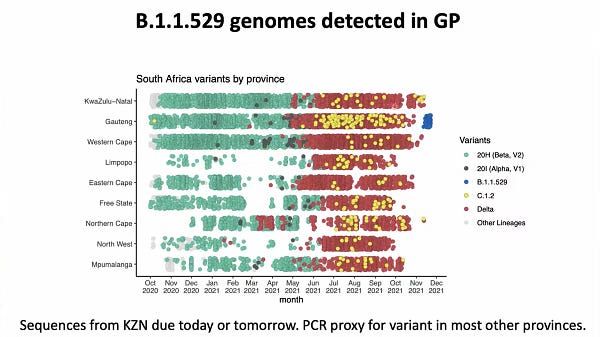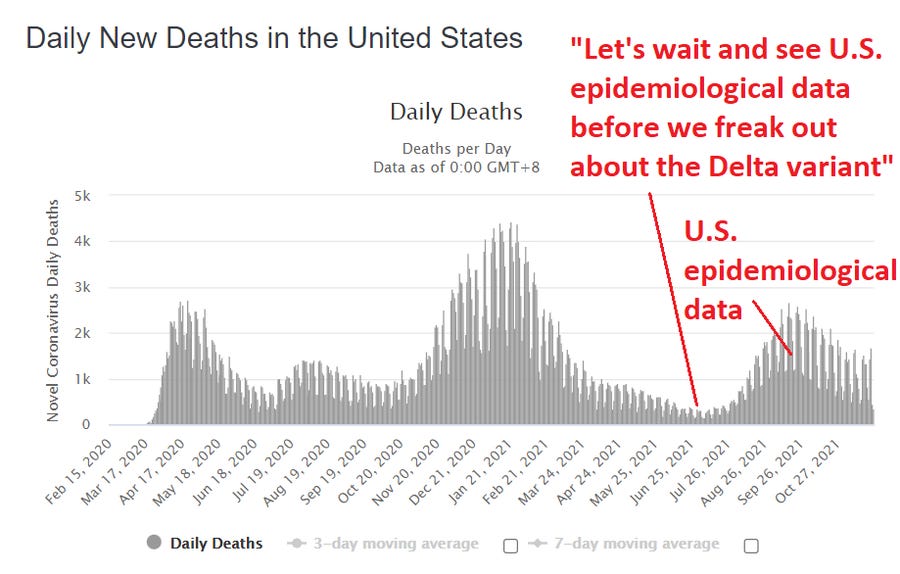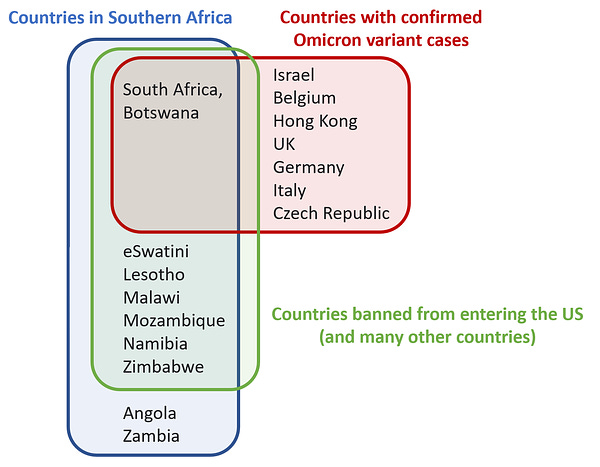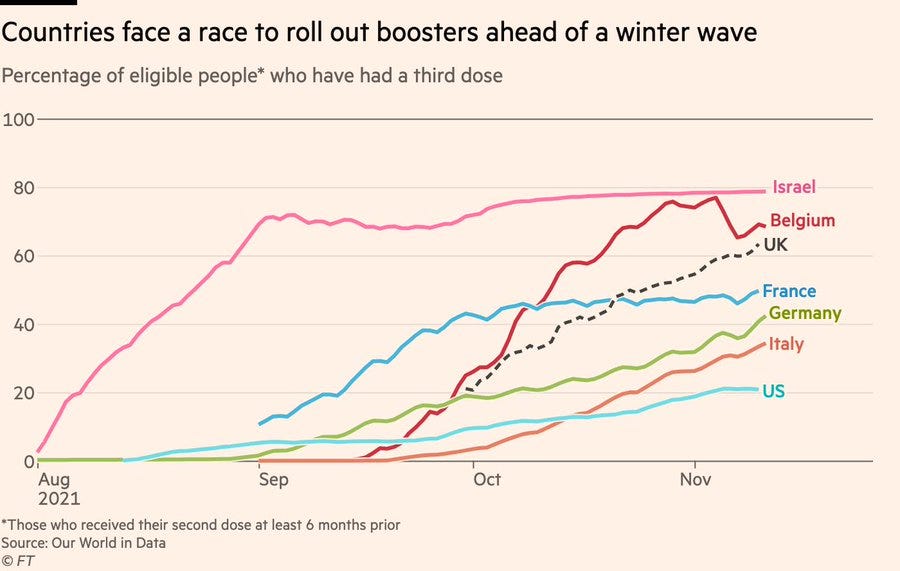When it comes to the Covid pandemic, it’s important to react quickly. Last time a major new variant emerged, we watched millions of Indian people die while we sat there and waited for U.S.-specific data before taking any kind of serious action. This was the result:
Fortunately, it appears that the world is reacting to the new Omicron variant with much more urgency than it reacted to Delta. But it can be difficult to cut through the noise. Back when Covid first started, I used to tweet out a series of “coronavirus tweets from the experts” every day, to help people keep up with what the most knowledgeable voices were saying. So I thought I’d reprise that here, and point to a few articles and Twitter threads that have helped me better understand this new threat.
First, of course, check out my video interview with Eric Topol. But in addition, here are some other points I’ve gleaned from the past three days of reading.
Point 1: Yes, Omicron is extremely worrying.
So why is Omicron worth freaking out about? Two reasons. First, it’s spreading fast, and taking over very quickly from the Delta variant. And second, unlike Delta and other variants, Omicron has evolved a whole suite of mutations that are thought to facilitate evasion of known antibodies, along with some mutations that may make it more transmissible. Read this thread by Christina Pagel to see why scientists and public health officials first became alarmed:


Here is a Nature article explaining what we know about the new variant.
Trevor Bedford, a mathematical epidemiologist who is generally regarded as one of the most trusted voices on the subject of Covid mutations, has a thread explaining why the mutation pattern seen in Omicron is so alarming. Here, reposted from above, is a key graph showing just how big a genetic jump Omicron is compared to other variants:
The upshot:

The WHO, meanwhile, believes that Omicron has a higher reinfection risk than other variants.
And here is a more technical thread about Omicron’s escape potential, from the Bloom Lab:

(Note: At this point, the Omicron variant was still being called the Nu variant. That name was changed, for obvious reasons.)
A rumor is going around that Omicron is less deadly than other variants, but so far this is unsubstantiated. It’s based on an out-of-context quote from a South African doctor who found only mild cases among a group of young, healthy people. Once again, wishful thinking springs eternal, but don’t fall for it.
That said, the more dramatic graphs you’ve seen about Omicron spreading like wildfire may overstate the speed of its spread:


Nevertheless, we don’t want to make the mistake we made with Delta. We’ll only know for sure how dangerous this variant is until after it does its damage. So we can’t wait to be sure; we must act now.
Point 2: No, this doesn’t mean we’re headed back to March 2020.
Before we talk about what actions we can take, here’s one more point that’s worth mentioning: Even if Omicron is an escape variant, that does not mean we’re “back to square one” with regards to this pandemic. It’s all a matter of degree. As Katherine J. Wu explains, our bodies develop a very diverse array of defenses against new viruses, and even a variant which evades some of those defenses won’t simply breeze past all of them. And as this paper in Nature shows, it takes many many mutations to fully escape antibodies to existing variants, and there’s also T-cell immunity to contend with. So the vaccination we’ve already done was not wasted, and the immunity we’ve built up is not useless. Booster shots of the existing vaccine will be useful, and we should all get them.
BUT, as that very same Nature paper shows, there’s a good chance that Omicron will be able to bypass existing immunity to a much greater extent than other variants. Michael Worobey has a good thread on this. Basically, the authors made a synthetic spike protein with a bunch of mutations they thought would allow it to escape existing known antibodies — many of which are now found in the Omicron variant — and they found that it was indeed very good at escaping antibodies. (It’s worth noting that at least one of that papers’ authors is quite pessimistic about Omicron.)
So while it’s still important to get a booster shot, we may need more if we’re going to beat Omicron.
Point 3: Travel bans on African countries are not going to stop Omicron.
OK so how do we stop this scary new variant? It’s important to realize that travel bans on African countries have no chance whatsoever at stopping Omicron from reaching our shores. This should be obvious from the fact that country-specific travel bans never stopped any other Covid variant. But it bears repeating. Omicron is already out there, and soon will be everywhere.
Florian Krammer has a thread suggesting that although Omicron was first detected in Southern Africa just a few days ago, it has probably been circulating internationally for a while.

So we should ditch the travel bans; at best they’re simply theater, and at worst they could give us a false sense of security. Even worse, banning travel from countries that find new variants simply punishes countries with good variant surveillance!


Point 4: Variant-specific booster shots are already in the works.
So if travel bans won’t work, what will? The obvious approach to an escape variant is to use variant-specific boosters, sort of like we do for flu shots every year.

Here is a thread from Meg Tirrell about how vaccine manufacturers are already working on variant-specific boosters:

Moderna is also working on a multi-variant booster, sort of like what we use for flu shots.
So both vaccine manufacturers and the administration are on high alert. That means the ball on variant-specific boosters is now in the FDA’s court. It’s very important that they streamline the approval process. After that, it will be up to the CDC to recommend variant-specific boosters to the general public.
Meanwhile, as Topol noted in our interview, a pan-Covid “supervaccine” of the type currently being worked on by multiple labs would be even better than having to get Covid shots every 6 months or 1 year. It would allow us to put an end to this pandemic decisively, once and for all. So we need a new version of Operation Warp Speed to fund and coordinate the development one or more supervaccines.
My thoughts
OK, so those are the views of the experts. If you want more, you can follow my Twitter list of Covid experts. But I’d also like to give some of my own thoughts here.
Basically, the age when we could expect to stop the virus with non-pharmaceutical interventions — lockdowns, social distancing, masks, test-and-trace — is long, long over. Not only has popular appetite for this strategy waned to almost nothing, but new variants are so contagious that these strategies just aren’t sufficient to stamp out the virus. Every country except China is transitioning to a “live with Covid” strategy (and China is hurting itself by trying to maintain its “zero Covid” policy). So while you should still wear a mask, and while some cities may do some limited business closures, we should assume that distancing measures will not be our first line of defense against Omicron.
Vaccines will be our first line of defense. In the short term this means getting a booster shot of the existing vaccine, in order to restore antibody levels in time for the Omicron wave. Unfortunately, America has been doing an absolutely awful job of rolling out booster shots.
This isn’t because of antivaxers, who, while a pernicious force, are only about 20% of the population. Instead, it’s because America’s public health authorities dragged their feet on recommending that Americans get booster shots:


As Topol noted in our interview, the biggest reason for this was that U.S. agencies like the CDC are extremely provincial, and basically ignored evidence from other countries. That’s very bad, and it fits with the general narrative of a crisis of competence at the CDC.
But another reason, which Topol acknowledges, is that some public health officials in the U.S. saw boosters as taking away vaccine doses from developing countries. With America now mostly vaccinated, these officials decided that recommending a third shot would harm global equity. The head of the WHO certainly made this argument, calling booster shots a “scandal”. There were op-eds in major papers and articles in reputable journals pushing the idea, and it was so widespread that I even saw articles about how to deal with guilt after getting a booster.
As I see it, this argument is ridiculous. The correct response to vaccine scarcity is not to imagine a zero-sum competition between the developed and developing worlds; it’s to simply make a lot more vaccine doses. As our successful ramp-up of vaccine manufacturing at the beginning of this year showed, we can very quickly expand our production a whole lot when we deem it a priority. But instead of making that our priority, we succumbed to the pernicious fantasy that the number of doses is fixed, and the result was that both Americans and people in the developing world died unnecessarily.
With Omicron, it’s likely that a similar mistake will cause a lot more deaths than it did with Delta. We face the terrifying prospect that an unholy alliance of antivaxers and misguided public health officials will stop us from getting boosters — including variant-specific boosters, when those come out.
We cannot let that happen. The Biden administration needs to overrule the public health establishment where necessary, and urge everyone to get boosters ASAP. And even more importantly, it needs to put a lot more resources into significantly ramping up vaccine manufacturing. As I’ve said since the start, this will be a long war. Omicron has reminded us that it’s far from over.
Update: Here’s a second post with one more week of info.









Will this just be a perpetual boy who cried wolf? I took fairly low precautions before getting my two moderna doses in Spring '21, and have taken no precautions since. My family and pretty much everybody I care about did similarly.
Nobody in my network even noticed Delta despite all the histrionics, and this feels a lot like a rerun.
One barrier to the rapid expansion of booster shots, beyond production and distribution, is the growing wariness about day-after effects. I scheduled my booster on the day before a day when I had nothing scheduled. Sure enough, I spent that second day on my back (as I did with my second Moderna shot earlier this year). Anecdotally, I'm hearing more people who were eager vaccine takers earlier this year say they're putting off their boosters until they can plan a day off from work and family obligations. The problem here may not be limited just to those who had reactions to the first round of vaccines, since word-of-mouth accounts can drive more widespread concerns about those experiences -- or just give busy people people another reason to delay what they know they should do. I have not seen any data on how large that population who suffered these Day 2 effects is. And, although these effects are relatively minor, it they cause you to lose a day of work, that's significant. It seems to me that health authorities should be addressing this, not ignoring it. There are ways to overcome this problem, including working with employers to provide the boosters on a sequenced basis (employers may also become wary of incurring Day 2 absences from their staff if all are given boosters in the same week) and providing pay for those who miss work due to second day effects. But, not talking about it and not dealing with it is sure to slow down the needed uptake of boosters.